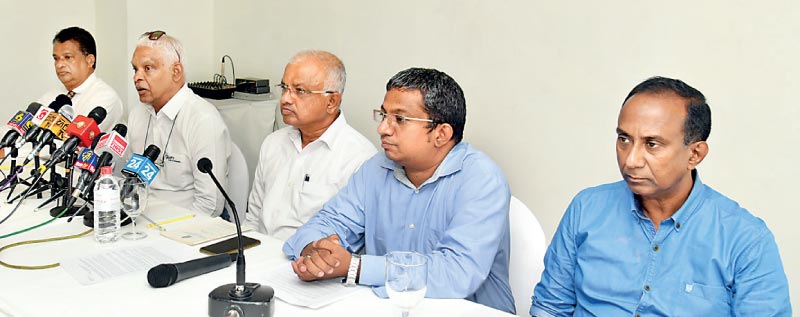Wednesday Feb 18, 2026
Wednesday Feb 18, 2026
Thursday, 24 March 2022 03:05 - - {{hitsCtrl.values.hits}}

From left: Sunway Holidays MD Ramesh Dassanayake, Colombo City Restaurant Collective President Harpo Gunaratne, Association for Small and Medium Enterprises in Tourism (ASMET) Immediate Past President Rohan Abeywickarama, General Secretary Prebuddha Jayasinghe and Committee Member M.U. Lantra at the media briefing on Tuesday - Pic by Ruwan Walpola
Association of Small and Medium Enterprises in Tourism Sri Lanka (ASMET) and Colombo City Restaurant Collective (CCRC) on Tuesday strongly opposed any necessity to change the existing Tourism Act No. 38 of 2005 completely.
“We collectively remain steadfast in our opinion that the majority of the new proposals brought forward by the regulator can certainly be implemented within the current Tourism Act No. 38 of 2005,” the two industry bodies said at a joint media briefing yesterday under the ‘One Industry One Voice’ umbrella.
Despite the dire economic circumstances that require urgent attention and actions to repair and restore what’s being lost, Sri Lanka Tourism Development Authority (SLTDA) attention is sadly displaced, the industry bodies claimed.
“The regulator is more worried about changing the Tourism Act, rather than addressing these burning issues in the tourism industry, which is grappling to survive in aftermath of a global pandemic. Both ASMET and CCRC stand strong and united against the repealing of the Current Tourism Act No. 38 of 2005,” the industry stakeholders said.
Both CCRC and ASMET pointed out that the repealing of the current Tourism Act will not result in generating a single tourist more to the country.
“There are more important and burning issues on which, the regulator should focus attention to, which has not happened. Unfortunately, neither the opinions are sought from the business generators nor do they engage in any discussion to get over the challenging times together,” the industry bodies asserted.
In an unprecedented economic crisis, the regulator should unify the industry, they said, claiming that instead divisions are created among the tourism related associations, which is detrimental to the revival of the battered tourism industry.
ASMET stakeholders said the tourism industry continues its efforts to survive in the post-COVID era, but the authorities have failed to provide proper solutions towards the extension of the financial moratorium beyond 30 June.
They also lamented that the visible lack of tourism promotions is one of the main issues the industry, including the formal SMEs, continue to face as the regulatory bodies focus more on consumer based marketing than the business-to-business (B2B) promotional activities such as trade fairs, road shows and market-centric promotions.
“It is indeed noteworthy that Destinations Management Companies (DMCs) in Sri Lanka are responsible for nearly 65% of the total tourist arrivals, accounting to nearly 55% of the total revenue generated by tourism to Sri Lanka. DMCs spend around Rs. 1.5 billion of their own funds to promote Sri Lanka as a lucrative holiday, meeting, incentive, wedding, honeymoon destination in numerous overseas markets with the trade fairs and road shows organised by SLTPB,” they added.
ASMET said unlike the ‘wealthy hotel chains,’ and boutique resorts, formal SMEs are unable to participate in foreign trade fairs without the assistance of the regulatory bodies.
“It was mentioned by regulator that there are several SME associations struggling under the current dire economic circumstances of the country. Many of the members in these associations are not registered with SLTDA. The associations themselves are mostly recently formed and have registered by the regulator who is clearly driving a division within the tourism sector,” they claimed.
They said almost all members of those associations are suppliers of the DMCs who are licensed and registered with the SLTDA. “We strongly feel that priority should be given to those members who are registered with the SLTDA, who are in-fact, the establishments paying the Tourism Development Levy (TDL),” ASMET suggested.
They also said the negative foreign travel advisories of their significant source market countries have been weighing heavily on the negative impact made on the tourism industry.
CCRC pointed out that they were still recovering from the Easter Sunday attacks whilst they were harbouring expectations of considerable growth and stability in the sector in 2022.
“However, our industry has currently ground to a near standstill with new challenges the industry is facing at present. The continuous power cuts, shortage and unavailability of gas, restrictions placed on import of specified essential items has an adverse impact on the restaurant industry,” they added.
CCRC also expressed their concerns on the import restrictions placed on important items such as, salmon, imported steaks, lamb, cheese, wine and spirits.
“We appeal to the authorities to allow the industry namely the importers and suppliers to import direct as these items are not available locally either,” the stakeholders stressed.
Being a highly labour intensive industry, the CCRC directly employs over of 30,000 people. “We as restauranteurs are extremely concerned about the impact on the current situation, where we are unable to operate our day-to-day business,” they said.
Despite various challenges faced by the restaurant sector, this current crisis is, by far the most difficult and unfortunate period the industry has had to endure, CCRC said, adding that it is similar to the other business communities that rely on the leisure and tourism industry in general.
ASMET founded in the year 2005, represents a diverse array of small and medium sectors in the Sri Lanka’s tourism industry. This includes destination management companies, hotels and numerous other service providers. ASMET is legally registered and licensed by SLTDA and boasts a membership exceeding 100 members.